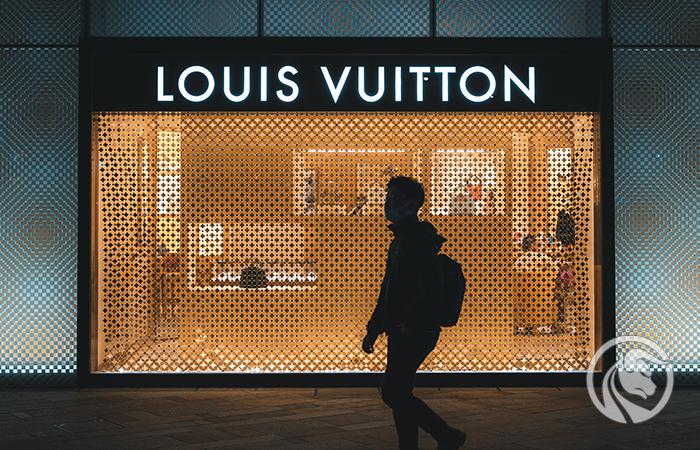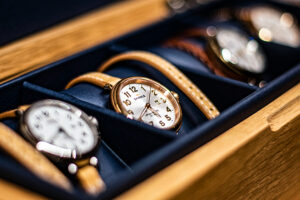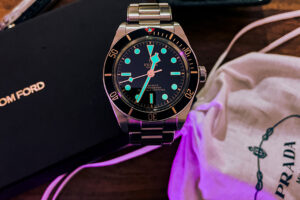Luxury companies on the rise. We check out the most interesting companies such as LVMH and Ferrari
Luxury will always defend itself. Luxury products and fashion are not only considered a status symbol, but also enjoy great popularity on the stock exchange. The interest in luxury and high-end goods among both the rich and the middle class is largely driven by human and social psychology. Sociologists and other scientists believe that throughout our evolutionary development from apes to our current state, humans have exhibited behaviors designed to signal to others that they have status, resources, and power.
In this review, we would like to delve into the fascinating world of the world's largest luxury companies that not only define the high lifestyle landscape, but also constantly transform it. We would like to present the five largest companies by market capitalization in more detail.
LVMH
- Market capitalization: $ 369 billion
- Revenues (2023): EUR 86,1 billion
- Net profit: EUR 15,17 billion
- Year of establishment: 1987
LVMH (Moët Hennessy Louis Vuitton) is the world's largest luxury goods company and one of the largest enterprises in the world. It is known for its extensive portfolio of 75 prestigious brands, of which Louis Vuitton is by far the most valuable brand. Louis Vuitton contributes an estimated one-third of total revenue and half of LVMH's profit.
In addition to the fashion and leather goods industry, LVMH also operates in other sectors. These include wines and spirits, perfumes and cosmetics, watches and jewelry and other activities. The brand portfolio includes famous names such as Dior, Bulgari, Tiffany & Co, Fendi, Givenchy, Loro Piana, Dom Pérignon and Moët & Chandon, to name just a few.
As a family-owned company, LVMH attaches great importance to the long-term development of each of its brands. Each of these brands must maintain its own identity. The life work of the founder and CEO is noteworthy Bernard Arnault, who is also the richest man in Europe.
Hermès
- Market capitalization: 213 billion USD
- Revenue (TTM): EUR 12,8 billion
- Net profit (TTM): EUR 3,95 billion
- Year of establishment: 1837
The history of Hermès dates back to 1837 and began in a craftsman's workshop in Paris. Today, the company has become a brand synonymous with luxury, offering a wide range of leather goods, lifestyle accessories, home textiles, perfumes, jewelry, watches and ready-made clothing. The main difference between Hermès and LVMH is that Hermès operates under one brand, while LVMH, as mentioned, has 75 different brands.
The most iconic Hermès products are Birkin and Kelly bags. These handcrafted items are known for long waiting lists and high resale values, underscoring the brand's reputation for unparalleled quality and desirability.
Financially, Hermès has demonstrated remarkable resilience and growth even in difficult economic times. For 2022, the company reported revenues of €11,6 billion. This figure makes LVMH about seven times larger than Hermès in terms of revenue. Interestingly, however, LVMH's market value is only 75% greater than Hermès. This indicates that the market places a high value on the evaluation of the Hermès brand.
Hermès is also family owned and operated. The Dumas family, which was the fifth richest family in the world in 2024, still holds a significant stake in the company and ensures the continuity of the brand and adherence to its core values. Now under the leadership of Axel Dumas, a sixth-generation member of the family, Hermès has maintained its reputation for quality for almost two centuries.
Richemont
- Market capitalization: USD 76,2 billion
- Revenue (TTM): EUR 19,8 billion
- Net profit (TTM): EUR 3,8 billion
- Year of establishment: 1988
Initially as part of a concern operating in both mining and the luxury goods industry, in 2000 Richemont focused exclusively on luxury, taking over renowned Swiss watch manufacturers A. Lange & Söhne, IWC Schaffhausen and Jaeger-LeCoultre.
Richemont's business covers various luxury segments, including high-end jewelry, prestigious watches and luxury leather goods. His impressive portfolio of brands includes names such as Van Cleef & Arpels, Montblanc, Piaget, IWC Schaffhausen, Panerai and Cartier.
Today, Richemont is the third largest luxury conglomerate. The company is controlled by Compagnie Financière Rupert, owned by Johann Rupert, the group's chairman, who holds 51% of the voting rights.
Ferrari
- Market capitalization: USD 63,2 billion
- Revenue (TTM): EUR 6,1 billion
- Net profit (TTM): EUR 1,2 billion
- Year of establishment: 1939
An icon in the automotive and luxury world, Ferrari represents the pinnacle of high-performance sports cars. Founded in 1939 by Enzo Ferrari, the company initially produced racing cars and entered the commercial vehicle market in 1947 with the Ferrari 125 S. Today, Ferrari is celebrated not only for its significant contributions to motorsports, but also for its exclusive line of luxury road vehicles .
Waiting lists for new Ferrari vehicles are getting longer every day. For some models, such as the new Purosangue SUV, waiting lists can reach up to three years. Still, Ferrari CEO Benedetto Vigna often explains that the company has no plans to increase production to meet high demand.
Ferrari's focus is not on high production numbers. The uniqueness, limited availability and exclusivity of their cars increase the value in the eyes of customers and thus increase the prestige of the brand. This strategy may seem counterintuitive, but it is simple and effective. If Ferrari increased production and sold more cars, it would risk losing the exclusivity that customers value. Therefore, Ferrari is probably the Hermès of the automotive world.
Kering
- Market capitalization: USD 49,6 billion
- Revenue (TTM): EUR 20,5 billion
- Net profit (TTM): EUR 3,4 billion
- Year of establishment: 1963
Kering was founded in 1963 and started as a wood and construction materials company in France. Since then, the company has transformed into a global luxury concern, known for its diverse portfolio of fashion brands. Kering's brands include Gucci, Saint Laurent, Bottega Veneta, Balenciaga and Alexander McQueen. Gucci accounts for approximately 50% of the group's revenues.
Under the leadership of François-Henri Pinault, the Pinault family plays an important role in the management of Kering. The acquisition of a majority stake in the Gucci Group in 1999 moved Pinault into the luxury sector.
This takeover faced significant competition, especially from their rival, Bernard Arnault, the head of LVMH. The conflict between the two former friends escalated over Gucci because LVMH already held a stake in the company when Pinault made his offer. Ultimately, LVMH sold its stake in Gucci to Kering, but the rivalry between the two titans continues.






















![Forex Club – Tax 9 – Settle tax on a foreign broker [Download the Application] Forex Club - Tax 9](https://forexclub.pl/wp-content/uploads/2024/02/Forex-Club-Podatek-9-184x120.jpg?v=1709046278)
![Trading View platform – solutions tailored to the needs of traders [Review] trading view review](https://forexclub.pl/wp-content/uploads/2024/03/trading-view-recenzja-184x120.jpg?v=1709558918)
![How to connect your FP Markets account to the Trading View platform [Guide] fp markets trading view](https://forexclub.pl/wp-content/uploads/2024/02/fp-markets-trading-view-184x120.jpg?v=1708677291)
![How to invest in ChatGPT and AI? Stocks and ETFs [Guide] how to invest in chatgpt and artificial intelligence](https://forexclub.pl/wp-content/uploads/2023/02/jak-inwestowac-w-chatgpt-i-sztuczna-inteligencje-184x120.jpg?v=1676364263)


![WeWork – the anatomy of the collapse of a company valued at $47 billion [WeWork, part II] wework bankruptcy story](https://forexclub.pl/wp-content/uploads/2024/04/wework-bankructwo-historia-184x120.jpg?v=1711729561)
![Adam Neumann – the man who screwed up Softbank [WeWork, part AND] adam neumann wework](https://forexclub.pl/wp-content/uploads/2024/04/adam-neumann-wework-184x120.jpg?v=1711728724)





![How to transfer shares to another brokerage office [Procedure description] how to transfer shares to another brokerage house](https://forexclub.pl/wp-content/uploads/2024/03/jak-przeniesc-akcje-do-innego-biura-maklerskiego-184x120.jpg?v=1709556924)

![The most common mistakes of a beginner trader - Mr Yogi [VIDEO] Scalping - The most common mistakes of a beginner trader - VIDEO](https://forexclub.pl/wp-content/uploads/2024/03/Scalping-Najczestsze-bledy-poczatkujacego-tradera-VIDEO-184x120.jpg?v=1711601376)
![Learning patience: No position is also a position - Mr Yogi [VIDEO] Scalping - Learning patience - No position is also a position - VIDEO](https://forexclub.pl/wp-content/uploads/2024/03/Scalping-Nauka-cierpliwosci-Brak-pozycji-to-tez-pozycja-VIDEO-184x120.jpg?v=1710999249)
![When to exit a position and how to minimize losses - Mr Yogi [VIDEO] Scalping - When to exit a position and how to minimize losses - VIDEO](https://forexclub.pl/wp-content/uploads/2024/03/Scalping-Kiedy-wyjsc-z-pozycji-i-jak-minimalizowac-straty-VIDEO-184x120.jpg?v=1710336731)

















